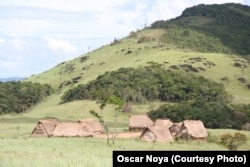People with no known contact with Western civilization nonetheless harbored microbes carrying genes that disarm the most modern antibiotics.
That's one finding from new research in the journal Science Advances that studied the bacteria, fungi and other microbes living in and on Yanomami people in a remote Amazon village.
The Yanomami present one of the last chances to see what microbes likely shared our bodies before humans settled down and evolved civilizations.
As Western diets and lifestyles spread across the globe, conditions like obesity, diabetes and immune disorders spread with them. Researchers wonder whether the microbes we lost along the way are partly to blame.
As concerns grow about the waning power of antibiotics, the new research suggests the seeds of their destruction were carried within us long before humans discovered the lifesaving medications.
Uncontacted village
The Yanomami are hunter-gatherers living in small villages deep in the Amazon rainforest. Though Westerners first encountered Yanomami people in the 1960s, every year another previously unknown group is spotted in the vast protected area they inhabit.
Researchers arrived in one such village in 2008, where residents said they had never seen Westerners before. With their consent and that of their chief, researchers swabbed forearms and mouths and took samples of feces from 34 of the 54 people in the village.
Scientists expected to find that the microbes carried some antibiotic-resistance genes. Many soil bacteria produce natural antibiotics to give them an advantage in competitive environments. It’s part of the microbial arms race that’s constantly taking place as other bacteria develop ways to counteract those antibiotics.
But the researchers also found nearly as many genes that disarm synthetic drugs that no known microbes produce.
“That really was one of the major surprises,” said Gautam Dantas from the Washington University School of Medicine in St. Louis, Missouri, because it shows “they have this ability to rapidly adapt to things we throw at them, maybe even things we don't think they’ve been exposed to before.”
Silent resistance
It suggests that even those who haven’t been treated yet are harboring genes that will ultimately defeat these wonder drugs.
“It emphasizes the need to ramp up our research for new antibiotics, because otherwise we’re going to lose this battle against infectious diseases,” Dantas said.
And, he said, it also shows the need to be more cautious with the antibiotics we have. Doctors are campaigning to reduce the use of the drugs in patients who would recover without them. And they oppose the widespread practice of routinely treating healthy livestock with antibiotics to prevent illness.
“You start out with an existing reservoir of antibiotic resistance genes” waiting to be switched on, Dantas said. “And then when you use antibiotics, whether it’s in agriculture or the clinic, you amplify the amounts.”
Diverse ecosystem
In studying the entire population of microbes inhabiting the Yanomami’s skin and guts, known as their microbiomes, the researchers also found more diversity than in any other people previously studied — more than in Malawians or other Amazonian farmers, for example, and far more than in Americans.
“As traditional societies adapt to Western life practices, they are losing many of the benefits entailed by hosting a rich bacterial diversity,” said lead author Jose Clemente at the Icahn School of Medicine at Mount Sinai in New York.
For example, he said, the Yanomami carried bacteria that can prevent kidney stones. These bacteria were nearly absent in the other groups studied.
“Our study, I think, emphasizes the need to get a better understanding of the microbiota in non-Western populations before their microbial diversity is lost,” Clemente said, “and with it the possibility to find microbes that we still don’t know about that could potentially have therapeutic value.”
But how healthy are the Yanomami? Another study by some of the same authors found that Amazonian tribes that had adapted to more Westernized lifestyles had higher rates of obestiy than the Yanomami, but the Yanomami had higher rates of stunting. The World Health Organization considers stunted growth a sign of malnutrition.
New science
Microbiome science is a brand-new field, with enormous areas of uncertainty. Even the idea that more microbial diversity is healthier is open to debate.
“We don’t have any real clear data about that,” noted Stephanie Schnorr of the Max Planck Institute for Evolutionary Anthropology, who was not involved in this research.
It's possible that less microbial diversity makes more sense for people living Westernized lifestyles, who spend less time outdoors and eat cooked, sanitized food.
“It may just be that it would be a bit of a drain for us to house such a diverse microbial ecosystem,” she said. “We’d like to say we have some idea. We have an idea that some microbiota are considered beneficial and some aren’t. But that continuously gets disproven, or we have some doubts that are thrown in there.”
“It’s really interesting,” Schnoor added. “And it’s great that we have such an open field for a lot of work to be done.”












